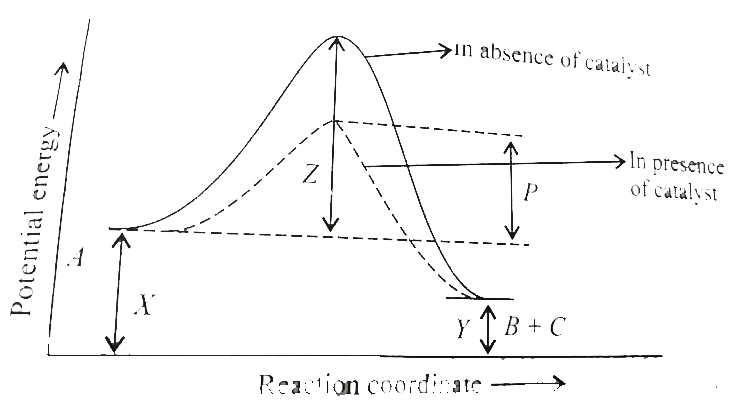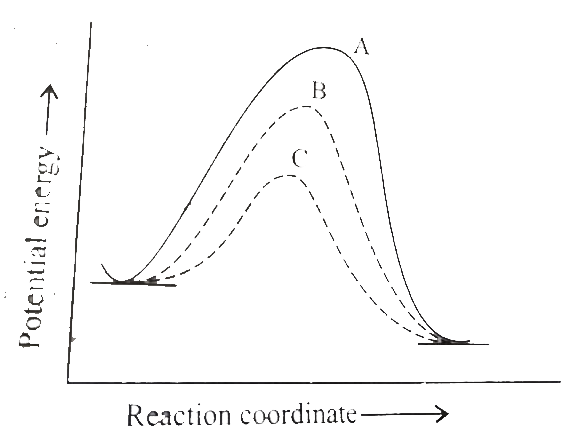Substances which alter the velocity of a reaction by mere presence, without undergoing any change in mass and compossition are termed catalyst and the phenomenon is known as catalysis
According to the adsorption theroy of catalysis, the rate of reaction increases because
Fe(OH)3 sol
As2S3 sol
Gold sol
Starch sol
The correct Answer is:A
Level on the cathode side will fall when dispersion medium moves towards anode, i.e., dispersion medium carries −ve charge or colloidal particles carry the charge, viz., Fe(OH)3
Topper's Solved these Questions
- SURFACE CHEMISTRYBOOK - CENGAGE CHEMISTRY ENGLISHCHAPTER - SURFACE CHEMISTRYEXERCISE - Exercises Multiple Correct
25 Videos
- SURFACE CHEMISTRYBOOK - CENGAGE CHEMISTRY ENGLISHCHAPTER - SURFACE CHEMISTRYEXERCISE - Exercises Single Correct
52 Videos
- SURFACE CHEMISTRYBOOK - CENGAGE CHEMISTRY ENGLISHCHAPTER - SURFACE CHEMISTRYEXERCISE - Exercises Subjective
10 Videos
- SOLUTIONSBOOK - CENGAGE CHEMISTRY ENGLISHCHAPTER - SOLUTIONSEXERCISE - Ex 2.3 (Objective)
9 Videos
- SYNTHETIC AND NATURAL POLYMERSBOOK - CENGAGE CHEMISTRY ENGLISHCHAPTER - SYNTHETIC AND NATURAL POLYMERSEXERCISE - Exercises Assertion Reasoning
10 Videos
Similar Questions
Substances which alter the velocity of a reaction by mere presence, without undergoing any change in mass and compossition are termed catalyst and the phenomenon is known as catalysis
Which is incorrect for a catalyst?
View SolutionAccording to the adsoption theory of catalysis ,the speed of the reaction increases because:
View Solution
Knowledge Check
According to the adsorption theory of catalysis the speed of the reaction increases because
Athe heat liberated during adsorption increases the rate of reactionBthe kinetic energy of reactants increases which increases the rate of reactionCthe activation energy of reaction increases which increase the rate of reactionDThe concentration of reactants at the active centres becomes high due to adsorption resulting in increase in the rate of reaction.Assertion : A catalyst increases the rate of reaction without itself undergoing any permanent chemical change.
Reason : A catalyst changes the Gibbs energy (ΔG) of the reaction and equilibrium constant of the reaction.AIf both assertion and reason are true and reason is the correct explanation of assertion.BIf both assertion and reason are true but reason is not the correct explanation of assertion.CIf assertion is true but reason is false.DIf both assertion and reason are false.Which of the following statement is correct? A)The rate of a reaction decreases with passage of time as the concentration of reactants decreases. B)The rate of a reaction is same at any time during the reaction C)The rate of a reaction is independent of temperature change D)The rate of a reaction decreases with increase in concentration of reactant(s)
AThe rate of a reaction decreases with passage of time as the concentration of reactants decreases.BThe rate of a reaction is same at any time during the reactionCThe rate of a reaction is independent of temperature changeDThe rate of a reaction decreases with increase in concentration of reactant(s)
Substances which alter the velocity of a reaction by mere presence, without undergoing any change in mass and compossition are termed catalyst and the phenomenon is known as catalysis
For the reaction (A→B+C) , the energy profile diagram is given in the figure below.

The decrease in the energy of activation in the presence of catalyst is
View SolutionSubstances which alter the velocity of a reaction by mere presence, without undergoing any change in mass and compossition are termed catalyst and the phenomenon is known as catalysis
In homogenous catalytic reactions, there are three alternative paths A, B, and C (shown in figure). Which one of the following indicates the relative ease with which the reaction can take place?

View SolutionRate of a reaction increases by 106 times when a reaction is carried out in presence of enzyme catalyst at same temperature. Determine change in activation energy.
View SolutionRedox is a reaction in which both oxidation and reduction will take place simultaneously . It is obvious that if one substance gives electron there must be another substance to accept these electrons . In some reactions, same substance is reduced as well as oxidised, these reactions are termed as disproportionation reactions.
For calculating equivalent mass in redox reaction change in oxidtaion number is realted to n-factor which is reciprocal of molar ratio.
Which of the following is an example of redox reaction ?
View SolutionRedox is a reaction in which both oxidation and reduction will take place simultaneously . It is obvious that if one substance gives electron there must be another substance to accept these electrons . In some reactions, same substance is reduced as well as oxidised, these reactions are termed as disproportionation reactions.
For calculating equivalent mass in redox reaction change in oxidtaion number is realted to n-factor which is reciprocal of molar ratio.
This reaction is an example of
Br2+OH−→BrO−3+H2O+Br−
View Solution
